| Listing 1 - 10 of 51 | << page >> |
Sort by
|
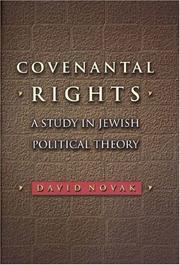
ISBN: 0691026807 0691144370 1282753967 1400823528 9786612753961 1400812828 Year: 2000 Publisher: Princeton (N.J.) : Princeton university press,
Abstract | Keywords | Export | Availability | Bookmark
 Loading...
Loading...Choose an application
- Reference Manager
- EndNote
- RefWorks (Direct export to RefWorks)
Covenantal Rights is a groundbreaking work of political theory: a comprehensive, philosophically sophisticated attempt to bring insights from the Jewish political tradition into current political and legal debates about rights and to bring rights discourse more fully into Jewish thought. David Novak pursues these aims by presenting a theory of rights founded on the covenant between God and the Jewish people as that covenant is constituted by Scripture and the rabbinic tradition. In doing so, he presents a powerful challenge to prevailing liberal and conservative positions on rights and duties and opens a new chapter in contemporary Jewish political thinking. For Novak, "covenantal rights" are rooted in God's primary rights as creator of the universe and as the elector of a particular community whose members relate to this God as their sovereign. The subsequent rights of individuals and communities flow from God's covenantal promises, which function as irrevocable entitlements. This presents a sharp contrast to the liberal tradition, in which rights flow above all from individuals. It also challenges the conservative idea that duties can take precedence over rights, since Novak argues that there are no covenantal duties that are not backed by correlative rights. Novak explains carefully and clearly how this theory of covenantal rights fits into Jewish tradition and applies to the relationships among God, the covenanted community, and individuals. This work is a profound and provocative contribution to contemporary religious and political theory.
Civil rights (Jewish law) --- Jews --- Human rights --- Politics and government --- Philosophy. --- Religious aspects --- Judaism --- History of doctrines. --- -Jews --- -Hebrews --- Israelites --- Jewish people --- Jewry --- Judaic people --- Judaists --- Ethnology --- Religious adherents --- Semites --- Basic rights --- Civil rights (International law) --- Rights, Human --- Rights of man --- Human security --- Transitional justice --- Truth commissions --- Jewish law --- -Judaism --- -History of doctrines --- -Philosophy --- Law and legislation --- -Religious aspects --- Civil rights (Jewish law). --- -Jewish law --- Hebrews --- Religious aspects&delete& --- Judaism&delete& --- History of doctrines --- Politics and government&delete& --- Philosophy
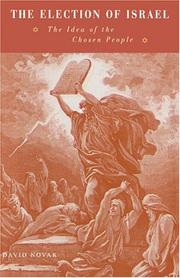
ISBN: 0521416906 0521044820 0511598165 Year: 1995 Publisher: Cambridge : Cambridge University Press,
Abstract | Keywords | Export | Availability | Bookmark
 Loading...
Loading...Choose an application
- Reference Manager
- EndNote
- RefWorks (Direct export to RefWorks)
In this book, David Novak conducts an historical, philosophical and theological reflection on the central Jewish doctrine of Israel's election by God, also known as the idea of the chosen people. Historically, he analyses the great change in modern Jewish thought brought about by Spinoza's inversion of the doctrine: that it was not God who elected Israel, but Israel who elected God. The development of that inversion is illustrated by the thought of the German philosopher-theologian, Hermann Cohen. Philosophically, Novak explores the ontological implications of the two differing theologies of election. Theologically, he argues for the correlation of election and revelation, and maintains that a theology of election is required in order to deal with two central questions, namely: who are the Jews, and how are Jews to be related to the world? The constructive picture which results leads to a fresh understanding of Jewish modernity.
Jews --- Judaism --- Juifs --- Judaïsme --- Election, Doctrine of --- History --- Identity. --- Doctrines --- Election, Concept d' --- Histoire --- Identité --- 221.08*1 --- -Jews --- -Hebrews --- Israelites --- Jewish people --- Jewry --- Judaic people --- Judaists --- Ethnology --- Religious adherents --- Semites --- Theologie van het Oude Testament: uitverkiezing; verbond; volk Gods --- -History of doctrines --- Identity --- -Theologie van het Oude Testament: uitverkiezing; verbond; volk Gods --- 221.08*1 Theologie van het Oude Testament: uitverkiezing; verbond; volk Gods --- -221.08*1 Theologie van het Oude Testament: uitverkiezing; verbond; volk Gods --- Hebrews --- Judaïsme --- Identité --- Identity, Jewish --- Jewish identity --- Jewishness --- Jewish law --- Jewish nationalism --- Election, Doctrine of&delete& --- History of doctrines --- Ethnic identity --- Race identity --- Legal status, laws, etc. --- Arts and Humanities --- Religion --- History of doctrines. --- History.
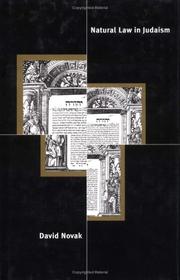
ISBN: 052163170X 0521055687 0511582846 0511006160 9780521631709 9780511006166 9780511582844 9780521055680 Year: 1998 Publisher: Cambridge : Cambridge University Press,
Abstract | Keywords | Export | Availability | Bookmark
 Loading...
Loading...Choose an application
- Reference Manager
- EndNote
- RefWorks (Direct export to RefWorks)
This 1998 book presents a theory of natural law, significant for the study of Judaism, philosophy and comparative ethics. It demonstrates that the assumption that Judaism has no natural law theory to speak of is simply wrong. The book shows how natural law theory, using a variety of different terms for itself throughout the ages, has been a constant element in Jewish thought. The book sorts out the varieties of Jewish natural law theory, illuminating their strengths and weaknesses. It also presents a case for utilizing natural law theory in order to deal with theological and philosophical questions in Judaism's ongoing reflection on its own meaning and its meaning for the wider world. David Novak combines great erudition in the Jewish tradition, the history of philosophy and law, and the imagination to argue for Judaism in the context of current debates, both theoretical and practical.
Jewish law --- Natural law --- Jewish ethics --- Philosophy --- Jewish religion --- Ethics, Jewish --- -Natural law --- Law of nature --- Natural rights --- Nature, Law of --- Rights, Natural --- Law --- Jews --- Religious ethics --- Biblical law --- Civil law (Jewish law) --- Halacha --- Halakha --- Halakhah --- Hebrew law --- Law, Hebrew --- Law, Jewish --- Law, Mosaic --- Law in the Bible --- Mosaic law --- Torah law --- Law, Semitic --- Commandments (Judaism) --- Ethics --- Law of nature (Law) --- Nature, Law of (Law) --- Arts and Humanities --- Religion --- Jewish law - Philosophy --- Natural law. --- Jewish ethics. --- Philosophy.
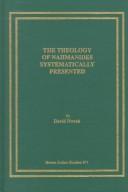
ISBN: 1555408028 Year: 1993 Publisher: Atlanta, Ga. Scholars Press
Abstract | Keywords | Export | Availability | Bookmark
 Loading...
Loading...Choose an application
- Reference Manager
- EndNote
- RefWorks (Direct export to RefWorks)
Judaism --- History of doctrines --- Na hmanides, ca. 1195-ca. 1270. --- Judaism - History of doctrines. --- 1 <=924> NACHMANIDES --- Jewish theology --- Theology, Jewish --- 1 <=924> NACHMANIDES Joodse filosofie:--oudheid en middeleeuwen--NACHMANIDES --- Joodse filosofie:--oudheid en middeleeuwen--NACHMANIDES --- Doctrines --- Naḥmanides, --- Bonastruc de Porta, --- Gerondi, Naḥman ben Mosheh, --- Girona, Mossé de, --- Moisès ben Nahman, --- Moses ben Naḥman, --- Moshe ben Nachman, --- Moshe, --- Mosheh ben Naḥman, --- Mossé ben Nahman, --- Mossé, --- Nachman, Moshe ben, --- Nachman, --- Nachmanides, --- Nahman, Moisès ben, --- Naḥman, Moses ben, --- Naḥman, Mosheh ben, --- Nahman, Mossé ben, --- Naḥmanide, --- Nakhmanid, --- Porta, Bonastruc de, --- Ramban, --- נחמנידס --- נחמן --- נחמן, --- רמב״ן, --- רמבן --- רמבן, --- רמבן השלם --- רבינו הרמב״ן, --- משה בר נחמני, --- משה בר נחמן --- משה בר נחמן, --- משה ב״ר נחמן, --- משה בן נמחן, --- משה בן נחמן --- משה בן נחמן, --- משה בן מחמן, --- משה בן מימון --- משה הן נחמן --- חידושי הרמבן --- הרמב״ן --- הרמב״ן, --- הלכות הרמבן
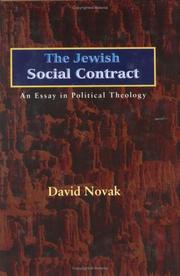
ISBN: 1282157337 9786612157332 1400824397 9781400824397 0691122105 9780691122106 9781282157330 661215733X Year: 2005 Publisher: Princeton : Princeton University Press,
Abstract | Keywords | Export | Availability | Bookmark
 Loading...
Loading...Choose an application
- Reference Manager
- EndNote
- RefWorks (Direct export to RefWorks)
The Jewish Social Contract begins by asking how a traditional Jew can participate politically and socially and in good faith in a modern democratic society, and ends by proposing a broad, inclusive notion of secularity. David Novak takes issue with the view--held by the late philosopher John Rawls and his followers--that citizens of a liberal state must, in effect, check their religion at the door when discussing politics in a public forum. Novak argues that in a "liberal democratic state, members of faith-based communities--such as tradition-minded Jews and Christians--ought to be able to adhere to the broad political framework wholly in terms of their own religious tradition and convictions, and without setting their religion aside in the public sphere. Novak shows how social contracts emerged, rooted in biblical notions of covenant, and how they developed in the rabbinic, medieval, and "modern periods. He offers suggestions as to how Jews today can best negotiate the modern social contract while calling upon non-Jewish allies to aid them in the process. The Jewish Social Contract will prove an enlightening and innovative contribution to the ongoing debate about the role of religion in liberal democracies.
Secularism --- Covenants --- Democracy --- Judaism and politics. --- Social contract --- Judaism and state. --- Ethics --- Irreligion --- Utilitarianism --- Atheism --- Postsecularism --- Secularization (Theology) --- Covenants (Jewish theology) --- Judaism and democracy --- Judaism --- Politics and Judaism --- Political science --- State and Judaism --- State, The --- Political aspects. --- Religious aspects --- Judaism. --- Political aspects --- Judaism and politics --- Judaism and state --- Social compact --- Consensus (Social sciences) --- Sociology --- Sovereignty --- Self-government --- Equality --- Representative government and representation --- Republics --- Agreements --- Religious aspects&delete&
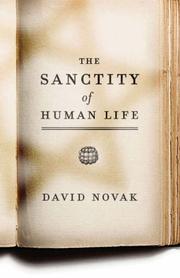
ISBN: 1589014669 1435627415 9781435627413 9781589014664 9781589011762 1589011767 9781589015043 1589015045 Year: 2007 Publisher: Washington, D.C. : Georgetown University Press,
Abstract | Keywords | Export | Availability | Bookmark
 Loading...
Loading...Choose an application
- Reference Manager
- EndNote
- RefWorks (Direct export to RefWorks)
Heated debates are not unusual when confronting tough medical issues where it seems that moral and religious perspectives often erupt in conflict with philosophical or political positions. In The Sanctity of Human Life, Jewish theologian David Novak acknowledges that it is impossible not to take into account the theological view of human life, but the challenge is how to present the religious perspective to nonreligious people. In doing so, he shows that the two positionsùthe theological and the philosophicalùaren't as far apart as they may seem.Novak digs deep into Jewish scripture and tradit
Medical ethics --- Embryonic stem cells --- National health services --- Assisted suicide --- Religious aspects --- Judaism. --- Research --- artsen (geneesheren) --- embryonale stamcel (menselijke embryonale stamcel, totipotent, pluripotent) --- geneeskunde (medische aspecten) --- hulp bij zelfdoding --- jodendom (judaïsme) --- normen en waarden --- politieke filosofie --- theologische ethiek --- 241.63 --- 296*52 --- 296*52 Joodse ethiek: Halacha; Minhag (gewoonten); Tora --- Joodse ethiek: Halacha; Minhag (gewoonten); Tora --- 241.63 Theologische ethiek: eerbied voor het leven en de waardigheid van de menselijke persoon --- Theologische ethiek: eerbied voor het leven en de waardigheid van de menselijke persoon --- Medicine, State --- National health care --- Nationalized health services --- Socialized medicine --- State medical care --- State medicine --- Medical care --- Medical policy --- Public health --- Biomedical ethics --- Clinical ethics --- Ethics, Medical --- Health care ethics --- Medicine --- Bioethics --- Professional ethics --- Nursing ethics --- Social medicine --- Embryonal stem cells --- Stem cells --- Assisted death (Assisted suicide) --- Assisted dying (Assisted suicide) --- Death, Assisted (Assisted suicide) --- Doctor-assisted suicide --- Dying, Assisted (Assisted suicide) --- Patient-directed death --- Patient-directed dying --- Physician-assisted suicide --- Suicide --- Euthanasia --- Religious aspects&delete& --- Judaism --- Research&delete& --- médecins --- cellule souche embryonnaire (cellule souche embryonnaire humaine) --- médecine (aspects médicaux) --- assistance au suicide (aide au suicide) --- judaïsme --- normes et valeurs --- philosophie politique --- éthique théologique --- Moral and ethical aspects --- Ethics, Medical. --- Life. --- Philosophy, Medical. --- Religion and Medicine.
Book
ISBN: 1800340524 1786949822 1906764077 9781786949820 9781906764074 Year: 2011 Publisher: Oxford : The Littman Library of Jewish Civilization,
Abstract | Keywords | Export | Availability | Bookmark
 Loading...
Loading...Choose an application
- Reference Manager
- EndNote
- RefWorks (Direct export to RefWorks)
This classic study of the idea of Noahide law traces the concept's historical development and shows how it is relevant to practical discussions of the halakhah pertaining to non-Jews and to relations between Jews and non-Jews. Individual analyses of each of the seven Noahide laws, drawing primarily on classical rabbinic texts by traditional commentators, are followed by a discussion of the underlying theory.
Noahide Laws. --- Noncitizens (Jewish law) --- Gentiles in rabbinical literature. --- Judaism --- Jewish philosophy. --- Jews --- Philosophy, Jewish --- Philosophy, Israeli --- Rabbinical literature --- Noachian Laws --- Noachide Laws --- Jewish law --- Noahides --- Relations. --- Philosophy --- Aliens (Jewish law)
Book
ISBN: 1316256367 1316237443 131625447X 1316250687 1316252574 1316248798 1316235556 1316163717 1107099951 1107492718 9781316235553 9781316250686 9781316248799 9781316163719 9781107099951 Year: 2015 Publisher: Cambridge : Cambridge University Press,
Abstract | Keywords | Export | Availability | Bookmark
 Loading...
Loading...Choose an application
- Reference Manager
- EndNote
- RefWorks (Direct export to RefWorks)
Why should anyone be a Zionist, a supporter of a Jewish state in the land of Israel? Why should there be a Jewish state in the land of Israel? This book seeks to provide a philosophical answer to these questions. Although a Zionist need not be Jewish, nonetheless this book argues that Zionism is only a coherent political stance when it is intelligently rooted in Judaism, especially in the classical Jewish doctrine of God's election of the people of Israel and the commandment to them to settle the land of Israel. The religious Zionism advocated here is contrasted with secular versions of Zionism that take Zionism to be a replacement of Judaism. It is also contrasted with versions of religious Zionism that ascribe messianic significance to the State of Israel, or which see the main task of religious Zionism to be the establishment of an Israeli theocracy.
Book
ISBN: 0195069242 9780195069242 Year: 1992 Publisher: Oxford: Oxford university press,
Abstract | Keywords | Export | Availability | Bookmark
 Loading...
Loading...Choose an application
- Reference Manager
- EndNote
- RefWorks (Direct export to RefWorks)
Judaism and social problems. --- Natural law. --- Social ethics. --- Jewish ethics. --- Judaism
Book
Year: 1975 Publisher: New York (N.Y.): Scholars studies press,
Abstract | Keywords | Export | Availability | Bookmark
 Loading...
Loading...Choose an application
- Reference Manager
- EndNote
- RefWorks (Direct export to RefWorks)
| Listing 1 - 10 of 51 | << page >> |
Sort by
|

 Search
Search Feedback
Feedback About UniCat
About UniCat  Help
Help News
News